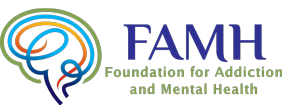What is Mental Health?
For individuals with mental health, they are able to realize their full potential as human beings, be productive at work, home, and in the community, and cope with the normal stresses of daily living. Mental health issues can be short- or long-term in nature and may or may not require additional support, such as medication. Everyone is vulnerable to struggling with their mental health, particularly if they do not MIND THE BRAIN. Mental illness is the second leading cause of disability and premature death in Canada and has tremendous implications for not only the individual, but also for society. For coping and recovery, an emphasis on holistic health is encouraged; that is, a focus on physical, emotional/psychological, social/relationships, and spiritual aspects of self.

How to Recognize a Problem
Significant impairment in work/school, family, or close relationships is an obvious sign of difficulty. Other signs may include changes in sleeping/appetite, dramatic mood fluctuations, consistently unhealthy relationships, flashbacks/nightmares or racing thoughts. Having these symptoms does not necessarily mean that you have a diagnosable mental health condition, but may be a sign that you could benefit from professional consultation to help overcome current roadblocks you are facing.
Common Mental Health Conditions
Some of the more common categories of mental health problems include:
Adjustment Disorders
Everyone encounters stress and difficulty in life. However, there may be times when a situation or series of events triggers an emotional reaction in someone that significantly impairs their functioning. Once the stressor(s) have alleviated, the symptoms will diminish within a few months. In such situations, it is not uncommon for people to think that they have a long-term mental health issue when, in reality, it is a shorter-term reaction to particular events.
Anxiety Disorders
Included within this category are Generalized Anxiety Disorder, Phobias, Obsessive-Compulsive Disorders, and Post-Traumatic Stress Disorder. People who live with anxiety may have: racing thoughts, difficulty concentrating or remembering things, physical symptoms (e.g., heart palpitations, panic attacks), intense fears, flashbacks, or repetitive behaviors/actions.
Grief and Loss
Coping with the loss of a loved one can be difficult and come with a variety of emotional and physical reactions, including, but not limited to, feelings of sadness, anger, denial, tearfulness, loss of appetite/sexual drive, isolation, and lack of enjoyment in normal activities. Given time, healthy self-care, and social/professional support these symptoms will typically lessen. Often having someone to process these feelings and experiences with can be helpful.
Mood Disorders
This category includes conditions such as Depression, Bipolar Disorder, and Dysthymia. Symptoms may include periods of hopelessness, low mood, suicidal thoughts or self-harming behaviour, trouble with basic functions such as sleeping/eating, and difficulty performing the daily activities of life, such as attending work, self-care, etc.
Other Conditions
Other mental health problems may include: addiction or substance abuse, trauma, learning disabilities, attention/concentration issues, chronic pain, relationship issues, stress management, communication, assertiveness, boundaries, and career exploration.
Treatment for Mental Health Conditions
Treatment for mental health varies depending on the individual but, ideally, will involve a holistic approach involving biological (physical), psychological (emotional), social (relationships), and spiritual elements. Specifically, treatment may include:
- Individual, couples, and/or family counseling
- Techniques to explore and address thinking patterns (Cognitive-Behavioural therapy)
- Exploration of internal dialogue, self-talk
- Exploration of family of origin and relationships
- Relaxation techniques (Hypnosis, Progressive Muscle Relaxation, deep breathing) -Specific approaches such as Eye Movement Desensitization and Reprocessing (EMDR) to address traumatic experiences
- Encouragement of self-care (fun and relaxing activities)
- Recommended homework and activities (e.g., yoga, meditation, structured hobbies)

